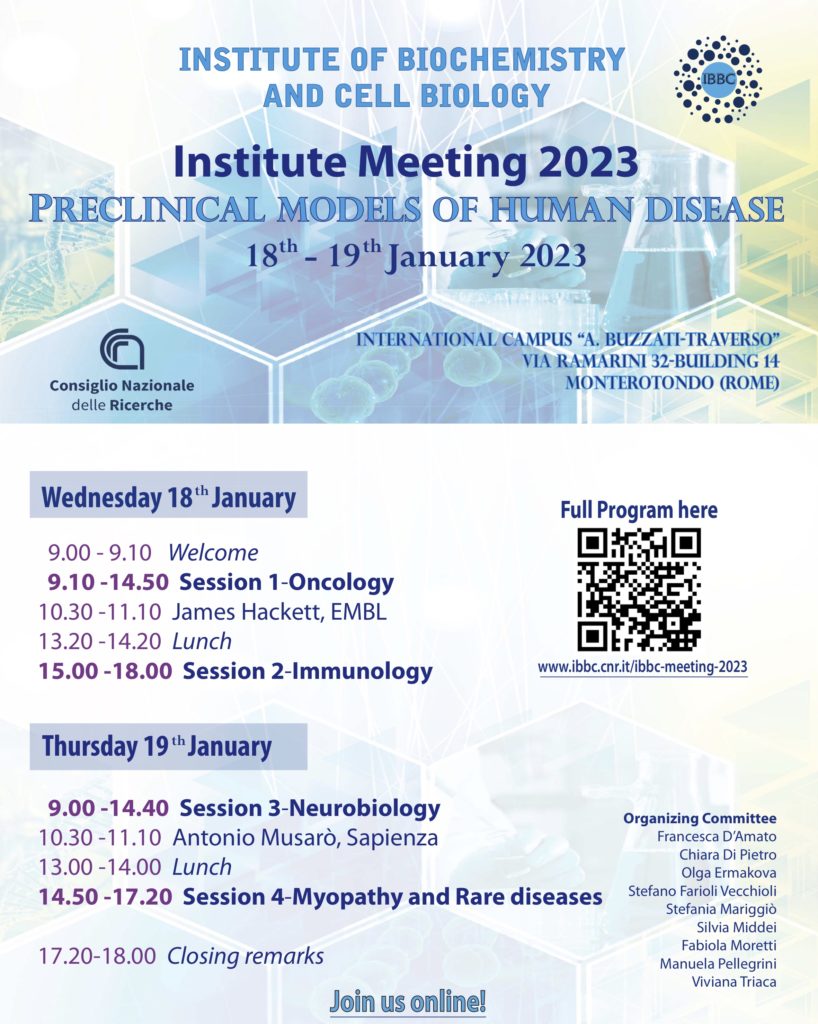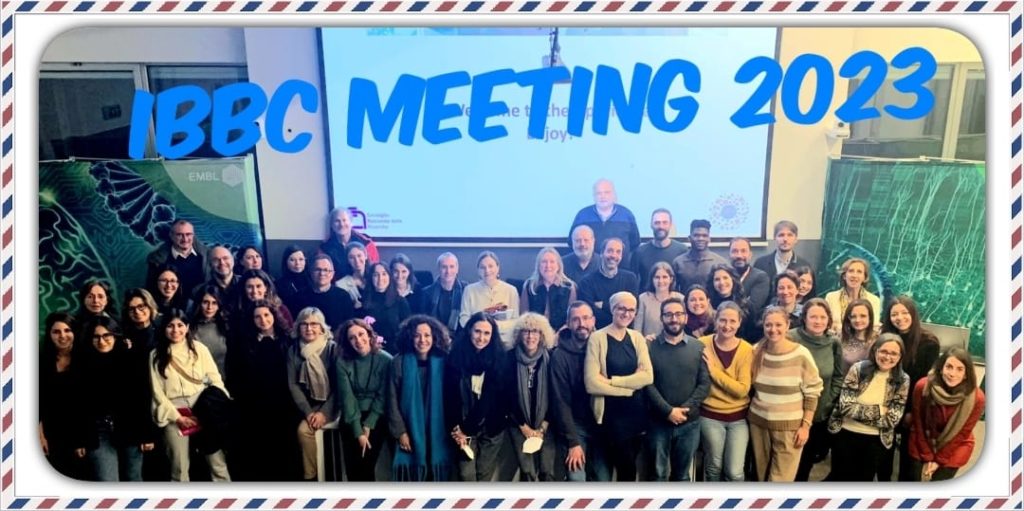IBBC meeting
18th-19th January 2023
Campus “A Buzzati-Traverso” – Monterotondo (RM)
Preclinical models of human disease
Main Topics
Session 1: Oncology
Session 2: Immunology
Session 3: Neurobiology
Session 4: Myopathy and Rare diseases
Wednesday -18th January
9:00-9:10 Welcome
Session 1: Oncology
Chairperson: Andrea Levi
9:10-9:30 Luca Cardone
Trascriptomic assessment of tumor KRAS dependency led to the repurposing of FDA-approved drugs for effective personalized therapy in Pancreatic Ductal Adenocarcinoma addicted to KRAS
9:30-9:50 Maria Laura Falchetti
Characterization of glioblastoma cells response to regorafenib
9:50 -10:00 Viola Donati (Mammano F group)
In vivo study of astrocytic connexin 43 role in a glioblastoma mouse model
10:00-10:20 Manuela Pellegrini
Hematopoietic progenitor cells transplantation as therapy for Ataxia-Telangiectasia syndrome
10:20 -10:30 Alessandro Giovinazzo (Pellegrini M group)
Characterization of ATM-KD mouse models and cancer associated ATM kinase mutations
10:30-11:10 Invited Speaker : James Hackett (EMBL)
Intergenerational disease-risk: why your father’s microbiome matters
11:10-11:40 Coffee break
11:40-12:00 Ferdinando Febbraio
Biomarkers for early diagnosis of bladder cancer
12:00-12:20 Silvia Middei
Early social enrichment modulates long term protection from tumors.
12:20-12:40 Giuliana Papoff (Ruberti G group)
Non-Small Cell Lung Cancer models to unveil mechanisms of resistance to target therapy and to investigate novel strategies for treatment. Effects of a combination of the EGFR-TKi, gefitinib, and a selective class I PI3K inhibitor
12:40-13:00 Francesca M. Pisani
DNA replication mechanisms in the shadow of Vesuvius
13:00-13:10 Diana Santos (Pisani FM group)
Dissecting the interaction of the DDX11 DNA helicase with TIMELESS, a fork-protection complex subunit
13:10-13:20 Paola Trono
hMENA isoforms regulate cancer intrinsic Type I IFN signaling and extrinsic mechanisms of resistance to immune checkpoint blockade
13:20-14:20 Lunch
14:20-14:40 Paola Tirassa
Translational medicine in HEAD and NECK Cancer (HNSCC)
14:40-14:50 Sonia Valentini (Moretti F group)
Molecular features and efficacy of the anticancer peptide Pep3 in the reactivation of p53 in cancer cells
Session 2: Immunology
Chairperson: Donato Civitareale
15:00-15:20 Chiara Parisi
NF-κB-mediated Immune-Escaping Mechanism in Breast Cancer
15:20-15:40 Rossella Sartorius (De Berardinis P group)
Induction of immune response by filamentous bacteriophage nanocarrier delivering a Tumor-Associated Antigen and the alpha-GalactosylCeramide
15:40-15:50 Maria Trovato (De Berardinis P group)
Comparative analysis of the neutralizing activity against SARS-CoV-2 Wuhan-Hu-1 strain and variants of concern: performance evaluation of a pseudovirus-based neutralization assay
15:50-16:10 Carmen Gianfrani
Clinical applications of gluten-specific T-cell based bioassays
16:10-16:20 Stefania Picascia (Gianfrani C group)
Pre-clinical applications of short oral gluten challenge in patients with celiac disease
16:20-16:50 Coffee break
16:50-17:10 Giuliana Catara (Manco G group)
Human Paraoxonase 2 (PON2): regulation and therapeutic approaches
17:10-17:30 Maria Rosaria Coscia
A new frontier for the generation of engineered monoclonal antibodies by the CRISPR/Cas9 system
17:30-17:50 Stefania Mariggiò
Targeting pro-inflammatory signaling for osteoclastogenesis tuning
17:50-18:00 Fulvio Saccoccia (Ruberti G group)
Phenotyping and target-drug discovery: HDAC8 multistage antischistosomal compounds exploiting the catalytic and a novel allosteric site
Thursday -19th January
Session 3: Neurobiology
Chairperson: Francesca D’Amato
9:00-9:20 Elvira De Leonibus
Early development of MPS IIIA dopaminergic neurons: at the nexus of behavior changes and therapy
9:20-9:30 Diletta Cavezza (De Leonibus E group)
Thalamo-hippocampal pathway regulates incidental memory capacity in mice
9:30-9:50 Laura Micheli (Tirone F group)
Neurogenesis decrease, cognitive decline, and changes in the intestinal microbiota associated with aging: protective effects of hydroxytyrosol, a component of olive oil
9:50-10:10 Stefano Farioli-Vecchioli
Novel strategies to enhance adult neurogenesis through the CrispR/cas9 –mediated conditional knockdown of p21Waf1/Cip1 gene
10:10-10:20 Carla Petrella
Effect of a multi strain probiotic mixture consumption in a mouse model of irritable bowel syndrome: focus on maternal separation-induced anxiety and depression symptoms
10:20-10:30 Marie Anne Makoudjou (Tirassa P group)
In vitro and in vivo studies to identify the biological function of peptides derived from the NGF precursor processing, and their role in the regulation of NGF receptor activities
10:30-11:10 Invited Speaker: Antonio Musarò (Sapienza University of Rome)
Cellular and molecular mechanisms of muscle-nerve interplay. A story of bias and scientific resilience
11:10-11:40 Coffee break
11:40-12:00 Silvia Mandillo
Sleep-related phenotypes are non-invasively uncovered using home cage monitoring in mouse models of ALS and DM1
12:00-12:10 Abraham Matey (Raspa M group)
A multimodal platform to study Sensory Decay and Aging in mice models
12:10-12:30 Ferdinando Scavizzi
A single comprehensive approach for microbiota and health monitoring in mouse colonies by shotgun metagenomic sequencing of animal or environmental samples
12:30-12:50 Roberto Massari
HiRIS SPECT/CT Hybrid system
12:50-13:00 Annunziata D’Elia (Massari R group)
FMR1 deletion in rats induces hyperactivity with no changes in striatal dopamine transporter availability
13:00-14:00 Lunch
14:00-14:20 Emilia Vitale
A functional role of CD33 SNP rs2455069 in microglial activation
14:20-14:40 Sara Marinelli
The “gender pain gap”: when males and females are from different planets
Session 4: Myopathy and Rare diseases
Chairperson: Maurizia Caruso
14:50-15:10 Giancarlo Deidda
Large-scale analysis highlights the role of epigenetics in Facioscapulohumeral muscular dystrophy (FSHD)
15:10-15:20 Chiara Santucci (De Santa F group)
Counteracting inflammation in Duchenne Muscular Dystrophy by promoting pro-regenerative macrophage polarization through a metabolic approach
15:20-15:30 Alessio Torcinaro (De Santa F group)
In vivo miR-200c inhibition counteracts oxidative stress and fibrosis in dystrophic mdx mice
15:30-15:50 Germana Falcone
Study of pathogenetic mechanisms and development of new therapeutic strategies for Myotonic Dystrophy type 1
15:50-16:30 Coffee break
16:30-16:40 Agnese Bonato (Caruso M group)
Cyclin D3-deficiency increases muscle oxidative metabolism and ameliorates pathophysiology in the mdx mouse model of Duchenne muscular dystrophy
16:40-17:00 Fabio Mammano
Antibody gene transfer treatment drastically improves epidermal pathology in a mouse model of keratitis ichthyosis deafness syndrome
17:00-17:20 Fabiola Moretti
Estrogens recover muscle regeneration impaired by DUX4 in orthotopic human xenograft
17:20-18:00 Closing remarks



